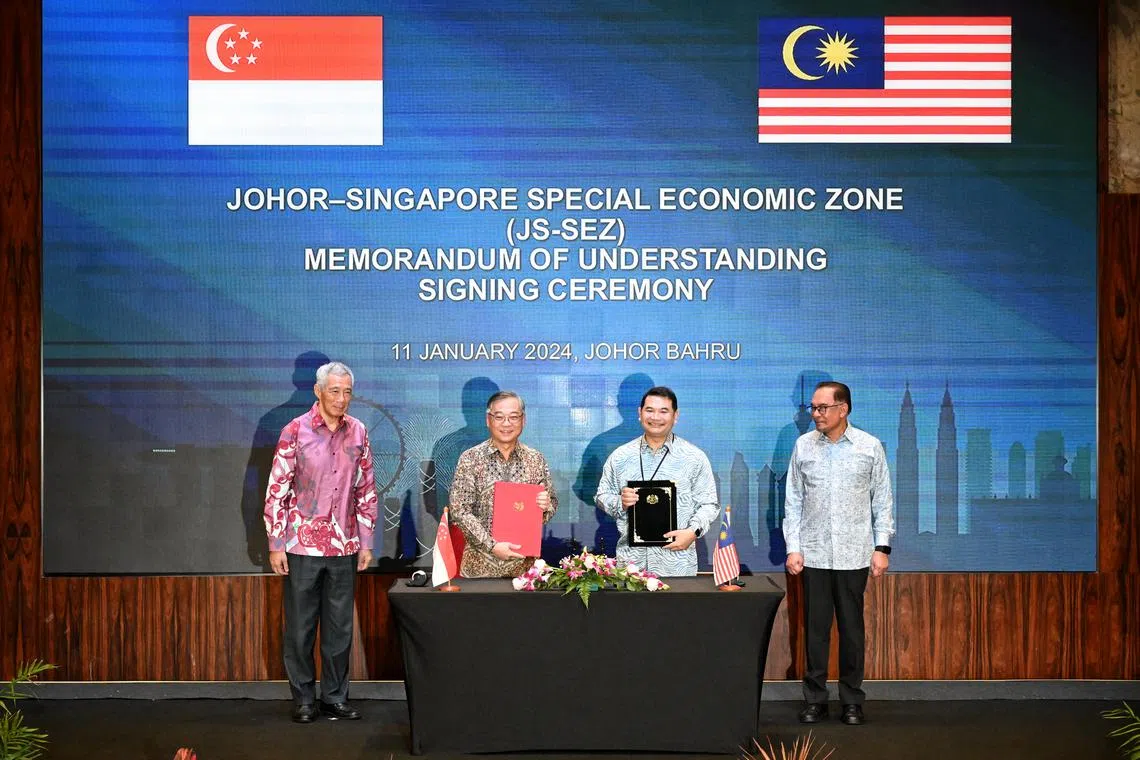Johor-S’pore SEZ to draw more MNCs amid trade war fears: Economists
Sign up now: Get ST's newsletters delivered to your inbox

PM Lee Hsien Loong (left) and Malaysian PM Anwar Ibrahim (right) witnessing the signing of the MOU to work on the JSSEZ by Trade and Industry Minister Gan Kim Yong and Malaysian Minister of Economy Mohd Rafizi Ramli.
ST PHOTO: KUA CHEE SIONG
Follow topic:
KUALA LUMPUR – Singapore and Malaysia’s commitment to develop the Johor-Singapore Special Economic Zone (JSSEZ) in southern Johor
Heightened geopolitical tensions – coupled with China’s latest economic policy, which will boost manufacturing exports and likely trigger another round of the US-China trade war – have made business conditions more uncertain, they added.
Malaysia and Singapore inked a memorandum of understanding (MOU) to work on the JSSEZ on Jan 11, about two months after the 10th Singapore-Malaysia Leaders’ Retreat in October 2023.
The definitive full-fledged agreement between both countries is expected to be inked in the fourth quarter of 2024, and an update will be provided at the 11th Malaysia-Singapore Leaders’ Retreat this year, according to the joint statement by both countries issued after the JSSEZ MOU was signed on Jan 11.
“The special economic zone would be the beneficiary of the US-China trade war tensions as it also lowers the cost of doing business and enhances trade activities,” said Bank Muamalat Malaysia chief economist and social finance head Mohd Afzanizam.
Companies located in the JSSEZ will benefit from tax breaks, a digitised process for cargo clearance at land checkpoints, a passport-free travel system that will expedite clearance of people at the border, and a one-stop business and investment centre to simplify application processes for approvals and business licences, said the joint statement.
RHB Research, in its research note dated Jan 8, said Johor has been one of the popular investment destinations for many multinational corporations (MNCs), especially those with regional offices in Singapore, due to its proximity to and cheaper resources than the city-state.
“Based on our conversation with some industrial players, regional MNCs are planning for relocation or decentralisation of operations especially after the pandemic, as part of their risk management to ensure uninterrupted production chain,” it added.
Dr Afzanizam said the Johor Bahru-Singapore Rapid Transit System (RTS) Link
I-PEX Singapore managing director Diana Peh said the multinational company, which develops and manufactures connectors for use in high-end electric and electronic devices and has a manufacturing plant in Johor Bahru, hopes the digitised processes for cargo clearance at land checkpoints will be implemented.
She said: “A faster and smoother cargo clearance process can boost our competitiveness and profitability.”
Analysts believe Singapore-based companies can tap Malaysia’s abundant supply of land and human capital, while the Republic offers its neighbour a vast bank of investment capital and access to technology.
“We see the JSSEZ as a win-win, with both sides in a position to offer what the other lacks,” said RHB Research analyst Alexander Chia.
Johor aims to replicate the success that China’s Shenzhen has enjoyed as it transformed into a modern high-tech metropolis with a population of more than 17 million from just 300,000 people in 1979. Shenzhen was China’s first SEZ, designated as such in 1980.
The success of the JSSEZ will come down to the policies crafted and how they are implemented, said economist Walter Theseira from the Singapore University of Social Sciences (SUSS).
In general, he said, special economic zones have had “mixed records” as they are often sold on the promise of catalysing skills development and industrial development, but these goals may not be achievable if the incentives are not aligned.
“It would be good for both sides to have a framework for evaluation and refinement of this whole system as (the discussions) go along,” said Associate Professor Theseira.
“I don’t think the first iteration will necessarily be the best one.”
Influx of investments into Johor by global tech companies like Microsoft as well as chipmaker Nvidia – which announced in 2023 it would develop an artificial intelligence ecosystem in the state – reflects confidence in the region by foreign investors.
“We expect more big names like Nvidia to invest in Malaysia, particularly in Johor. Prime Minister Anwar Ibrahim’s recent visit to the US should bear some fruit,” said RHB Research analyst Loong Kok Wen, referring to Datuk Seri Anwar’s meetings in November in San Francisco with technology giants such as Google, battery manufacturer Enovix, Microsoft and ByteDance, which owns TikTok.
Despite the uncertainty in the timeline of the JSSEZ, investor optimism in Johor’s property sector is expected to grow, said Ms Loong.
“The influx of investments and rising demand for industrial lands are already driving up land prices in Johor. Some of the land parcels near the Second Link Expressway were transacted at record prices (RM120 to RM125 per sq ft, or S$34 to S$36 psf) based on our checks,” she added.
Malaysian property developer Mah Sing Group, which has been in Johor for more than two decades, is optimistic about the development of the JSSEZ, saying it will serve as a catalyst for increased economic activities and boost the property market in the state.
“Mah Sing will continue to actively look for landbanks to expand our presence in Johor,” said its founder and group managing director, Mr Leong Hoy Kum.
Additional reporting by Natasha Ann Zachariah


